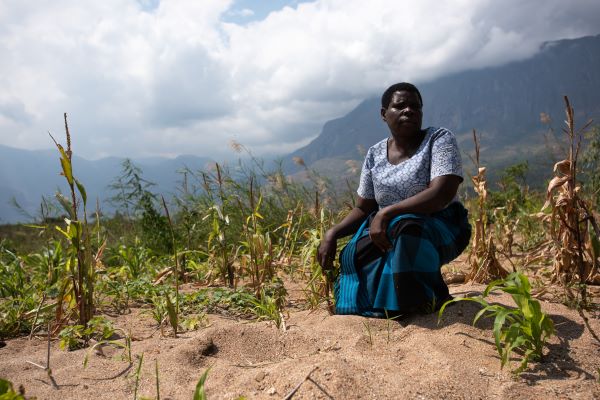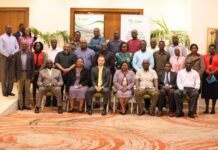In Southern Africa, the agricultural landscape is dotted with smallholder farmers, individuals tilling less than 10 hectares of land, striving to make a living while contributing to subsistence and commercial markets. Resilient smallholder farming communities form the backbone of agriculture in their respective countries, contributing significantly to food security and rural livelihoods. This vital sector is crucial for inclusive growth, but the challenges faced by smallholder farmers demand attention and strategic solutions.
Barriers to growth
While smallholder farmers actively participate in farming various crops and livestock, the barriers to their growth are significant:
- Farmers grapple with production and marketing challenges
- Limited access to resources for on-farm infrastructure, equipment, and inputs hinders their ability to fully utilise their land and expand production.
- The impact of climate change amplifies these challenges, necessitating investments in on-farm infrastructure and regenerative farming techniques to ensure quality production and a consistent supply.
At the marketing level, smallholder farmers face hurdles in accessing reliable routes to markets. Whether through informal markets, local supermarkets, fresh produce markets, or corporate clients, the main challenge remains low prices and high fluctuations. This creates a vicious cycle, restraining smallholder farmers in unprofitable and unsustainable practices.
Despite widespread entry into vegetable production, smallholder farmers predominantly grow low-value vegetables, such as spinach, kale, cabbages, carrots, and butternuts. These crops, considered easier and less expensive to grow, have experienced significant declines in real average prices since 2009. This lack of profitability is exacerbated by the farmers’ limited access to resources for productive infrastructure and inputs, hindering their capacity to capitalise on market opportunities.
Then there’s the issue of access to seed. The commercial sector faces no real challenges in accessing quality seeds due to effective collaboration between the government, regulatory authorities, and the commercial sector. However, in the subsistence sector, the lack of investment in breeding programs creates challenges in accessing improved seed varieties. Bridging the gap between science and farming requires differentiation of seed varieties for different market segments, improved data accessibility, and a focus on breeding for local contexts.
Policy initiatives: turning plans into action
South Africa’s Agriculture and Agro-processing Master Plan (AAMP) and the Competition Commission’s National Fresh Produce Market Inquiry are critical policy initiatives aimed at increasing the contribution of smallholder farmers. However, the success of these plans hinges on their effective implementation. While the AAMP aims to boost the share of small-scale vegetable producers, it requires a holistic support package covering funding, skills, infrastructure, inputs, and market access.
Across the continent, streamlining government funding processes and providing assistance in filling out application forms can enhance smallholder farmers’ chances of accessing much-needed funds. The focus should be on turning policy rhetoric into tangible support for those on the frontlines of agriculture.
Regional perspectives: challenges and opportunities
Explore key insights into the smallholder farming landscape in Southern Africa:
Namibia
- no.of smallholder farmers: 70,000
- Main crops: Maize, wheat, millet
- Limitations:
- Limited access to credit and modern farming technologies
- Erratic rainfall patterns
- Land tenure issue
Botswana:
- no.of smallholder farmers: 54, 908
- Main crops: Sorghum, maize, millet
- Annual cereal production: 200,000 tonnes (only about 17% of domestic consumption)
- Limitations:
- Limited access to markets
- Water scarcity
- The need for improved agricultural extension services
Zimbabwe
- no.of smallholder farmers: 1.5 million
- Main crops: Maize, tobacco, and cotton
- Limitations:
- Land tenure issues
- Political instability
- Limited access to credit and inputs
- Occasional droughts
Zambia
- no.of smallholder farmers: 1.5 million
- Main crops: Maize, sorghum, millet
- Arable land under cultivation: 17%
- Limitations:
- Inadequate infrastructure
- Limited access to markets
- Variability in rainfall patterns
Mozambique
- no.of smallholder farmers: 3.2 million
- Main crops: Cassava, maize, rice
- Smallholder farmer production: 95% of the country’s agricultural production
- Limitations:
- Limited access to credit and markets
- Post-harvest losses
- Low use of improved inputs
- Vulnerability to extreme weather events
Lesotho
- no.of smallholder farmers: 690,000
- Main crops: Maize, sorghum, and wheat
- Limitations:
- Limited arable land
- Vulnerability to soil erosion
- Water scarcity
Malawi
- no.of smallholder farmers: 3.1 million
- Average farm size:7ha
- Main crops: Maize, tobacco, tea
- Limitations:
- Dependency on rain-fed agriculture
- Limited access to modern inputs
- Vulnerability to climate change impacts
South Africa
- no.of smallholder farmers: 2.5 million
- Main crops: Maize, potatoes, sugarcane
- Limitations:
- Access to markets and resources
- Access to basic services
- Inconsistent policy enforcement
- Low capacity and knowledge-sharing
- Climate variability and change
The state of smallholder farmers in Southern Africa demands comprehensive, coordinated efforts. Government initiatives need to translate into actionable support, addressing the financial, infrastructural, and market access challenges faced by these resilient farmers. Bridging the gap in seed access and prioritising regional-specific challenges can pave the way for sustainable growth, ensuring smallholder farmers become key contributors to the broader agricultural sector.
Get in touch to learn more about RegenZ’s Smallholder Farmer Package empowering Southern Africa’s smallholder farmers.
Sources:









